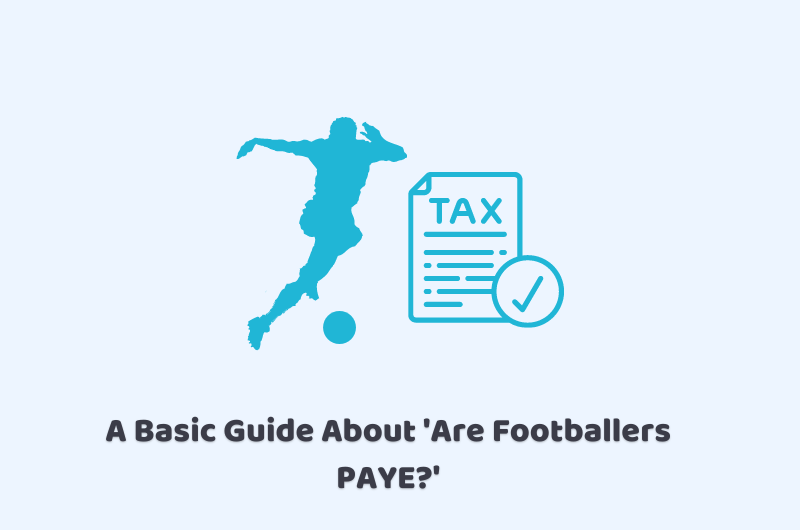
14/09/2022Tax Issues
For football lovers, sports is all about their favourite game. Fans possibly talk about the footballers all day, however, those who are associated with the tax experts want to know all about the complicated tax details that are paid by the footballers. This might include ‘are footballers self-employed’, whether they are PAYE, do they pay tax, and how would HMRC know the exact amount of earnings of a footballer.
If you are one such individual who is associated with the tax interest by any means, you are on the right page as we have brought you the details about what is PAYE, whether footballers are self-employed or not, and how HMRC gets an idea of the footballer’s earnings, and how much tax the footballers pay. Before delving further into the discussion you must begin with a basic understanding of PAYE.
We recommend finding professional help to further learn about ‘are footballers self-employed’. Talk to our guys and get your queries answered quickly.
What is PAYE?
PAYE is the abbreviation of pay as you earn as most of you may know already. As the name says it is a kind of system that deals with tax submissions and implications. Two of the main taxes in the UK that are dealt with through PAYE include national insurance contributions and income tax. If you are wondering whether they are compulsory or optional, the answer is yes they are compulsory and there is no escape.
However, there can be a discussion over the topic of how your employment status can make a difference in the process of tax implications and payments. If you are an employee of a company and get a pay slip every month, you are PAYE and you will be given tax through the system, as taxes will be deducted from your salary. You own a specific tax code in this scenario as well. This depends on the amount of income you are making that will decide how much tax you are going to pay as a PAYE employee.
Are Footballers Self-Employed?
When it comes to the discussion of footballers’ employment status. There are chances of them being PAYE if they are part of a club that has employed them. There are written contracts in such conditions between the club and the footballers just like the system runs in any other regular job for an employee.
Moreover, when you are paid through PAYE, the amount of national insurance contribution and income tax is already deducted from your monthly salary and the details are mentioned on your monthly pay slip. There is no escape so it is better to understand that there will be no room for any kind of foul play.
How Would HMRC Know about the Earnings of a Self-Employed Footballer?
Whether you are a footballer who is PAYE or self-employed, there is no chance that HMRC is not aware of the details of what you are earning through this. This knowledge is mandatory to be part of HMRC’s information about each one of you because this helps to send you the accurate tax bills to the employees as well as self-employed individuals. In most cases, the footballers tend to be the high earners. The amount of their earnings within a year is way more than £150,000. This makes them fall into the high tax bracket. Falling into the high tax bracket means that you are liable to pay 45% as income tax on the number of your earnings. You need to know the following threshold while you are considering your tax payments:
- If you are earning the amount of £12,570 within a year, the tax rate will be 0% for you.
- If you’re earning between the limit of £12,571 – £50,270, you will be charged with the basic tax rate which is 20%.
- If you’re earning between the limit of £50,271 – £150,000, you will be charged with the higher tax rate which is 40%.
- If your yearly income goes above a certain limit which is £150,000 +, you will be charged with the additional tax rate which is 45%.
Do Footballers Pay Tax?
As we have discussed that the footballers who are playing in contract with a football club are known to be employed. This means that the tax is paid directly to HMRC through the tax deductions from the salary just like any regular employee who is getting a salary on monthly basis. The tax bills are deducted automatically from your monthly salary even before you receive them. These rules are already told to all kinds of employees so the deductions are not misunderstood. Moreover, it is imperative to understand that you are PAYE only for the earnings that you are making through the club that you are associated with as a footballer.
The Bottom Line
Now that you have gathered a fair amount of information about ‘are footballers self-employed’, we can bring the discussion towards wrapping up. We can say that whether a footballer is PAYE or self-employed, there are tax implications just like any other individual with the employment status of an employee or self-employed. There is no chance that HMRC will give footballers any tax exemptions. Footballers normally fall in the higher tax bracket due to increased earnings and tax affairs are a high deal for them to handle. We hope these few minutes of reading have helped you to develop a better understanding of the employment status of footballers and the tax implications on them.
Our team of professional members loves to hear out your business problems and find out the possible and suitable solutions quickly. Call us on 02086868876 or email us today.
Disclaimer: The general information provided in this blog about ‘are footballers self-employed’ includes its text and graphics. It does not intend to disregard any of the professional advice.
